
President Trump says his takeover of policing in Washington, D.C., will serve as an example of policies he hopes to enact in other major U.S. cities, including New York, Los Angeles and Chicago. All the cities on his target list are led by Black mayors, and most have “sanctuary” policies limiting local cooperation with federal immigration authorities.
Responding to Trump’s threats, Chicago Mayor Brandon Johnson tells Democracy Now! that his city will not “cower or bend or be intimidated by these attempts to divide and conquer our communities.” He says that unlike Trump’s militarized approach, Chicago has been investing in mental health services, raising wages and building affordable housing as part of a larger campaign to improve quality of life. Contrary to Trump’s claims, violent crime is down in Chicago.
“We’re building the safest, most affordable big city in America, the most pro-worker city in America, and we’re doing it in a very collective way,” says Johnson.
Transcript
AMY GOODMAN: The Trump administration is escalating its takeover of the Washington, D.C., police force. Attorney General Pam Bondi has named the head of the Drug Enforcement Administration as D.C.'s emergency police commissioner, but D.C. Mayor Muriel Bowser and D.C. Attorney General Brian Schwalb have rejected the order. In addition, Bondi has ordered an end to Washington, D.C.'s sanctuary policies, which restricted D.C. police from aiding federal immigration enforcement. This comes days after Trump deployed 800 National Guard to Washington, D.C., as he declared a crime emergency in D.C., even though violent crime is at a 30-year low. Meanwhile, the Republican-controlled Congress is continuing to withhold a billion dollars taken away from Washington, D.C.’s budget earlier this year.
President Trump is also threatening to take action against other Democratic cities.
PRESIDENT DONALD TRUMP: You look at Chicago, how bad it is. You look at Los Angeles, how bad it is. And we have other cities that are very bad. New York has a problem. And then you have, of course, Baltimore and Oakland. We don’t even mention that anymore. They’re so — they’re so far gone. We’re not going to let it happen. We’re not going to lose our cities over this. And this will go further. We’re starting very strongly with D.C., and we’re going to clean it up real quick. Very quickly.
AMY GOODMAN: All the cities Trump named are run by Black mayors. Trump singled out Chicago Mayor Brandon Johnson for criticism.
PRESIDENT DONALD TRUMP: And if we need to, we’re going to do the same thing in Chicago, which is a disaster. We have a mayor there who’s totally incompetent. He’s an incompetent man. And we have an incompetent governor there.
AMY GOODMAN: We go now to Chicago, where we’re joined by Mayor Brandon Johnson, who’s served as mayor since 2023.
Mayor, thank you for joining us. Well, why don’t you start off by responding directly to President Trump’s criticism of you, but also the takeover of D.C. and what Chicago is doing about it?
MAYOR BRANDON JOHNSON: Well, good morning.
There’s a clear, fundamental difference between the approach that President Trump is taking versus how we are handling the very complex social issues that have, unfortunately, plagued our cities and America for decades. It is very evident that we have a president that has incredible disdain for working people. It’s pretty straightforward for us here in the city of Chicago. I remember a time, you know, Amy, when presidents declared wars on poverty. This president has declared war on poor people. And the work that we’re doing in Chicago — and really, cities across America — we’re investing in people, right? The fundamental difference between the authoritarianism that’s coming from the White House versus the collective community approach that we’re leading here in Chicago is that the president is looking to resuscitate the sins and the evil of the past, and the city of Chicago is moving progressively forward.
And so, for instance, we are investing in mental health and behavioral health. I’m the first mayor since the first Black mayor in the history of Chicago to reopen mental health clinics and provide mental health treatment across the city. When people are having mental health crises, a paid professional mental health provider shows up to those crises, versus a police officer, to provide the necessary care there, and that frees up law enforcement to address some of the other critical issues that we are dealing with.
The bottom line is this: Our approach in investing in people has led to some of the most historic declines in violence. The month of April, we had the fewest amount of homicides since 1962. Right now we are on pace to not only lower crime in a very significant way, we’re doing it in the very neighborhoods that have been historically disinvested in. And so, right now in the city of Chicago, we have a 30% reduction in homicides. Shootings and shooting victims are down nearly 40%. Robberies are down nearly 35%.
There is certainly more work to be done, but we’re not going to transform our cities if we revert back to a time in the past where the addiction of jails and incarceration has not led to safer communities. In fact, it has done the opposite. And so, as the mayor of this city, I don’t necessarily pay attention to name calling. It’s really about calling out the names of the people who have put mayors like myself in positions to lead.
The last thing that I’ll say is I’m thinking about, of course, the great history of the labor and the civil rights movement, where Dr. King said, if these two forces were to ever collide, what enormous potential it will have. And he came to the city of Chicago a generation ago fighting for fair housing, and he said, if we can get it right in the city of Chicago, we can do it anywhere in the world.
And that’s essentially what we’re doing. We’re carrying out the dreams and the hopes and aspirations of our ancestors, building the safest, most affordable big city in America, 10,000 affordable units by the end of my first term. Lot of work to do, but we’re not going to get it done if we don’t move forward with progressive policies. And we’re certainly not going to get it done if we revert back to a time in which, clearly, Donald Trump is salivating over, a time in which people have been deeply harmed by federal policy. We’re not going to go backwards; we’re going to continue to move forward as a city.
JUAN GONZÁLEZ: Mayor, I wanted to ask you also about Trump blasting the Illinois governor’s position and your position on cash bail, the impact that elimination of cash bail has had on the Black and Brown communities.
MAYOR BRANDON JOHNSON: Well, again, here’s yet another example of progressive policies that, you know, have led to a precipitous decline in violent crime. What we have seen is, in the past, there is a proclivity to criminalize poverty. And that’s essentially what has been happening for decades throughout the country. And so, by eliminating this barrier, where people were being held and detained for minor and offenses of essentially trying to survive, and people being held up in our jails simply because they cannot afford bail, we have discovered that that doesn’t necessarily drive violence down in the city of Chicago.
What drives violence down is when we are investing in our workers. You know, I passed an ordinance in the first few months of my time in office where we expanded paid time off for workers. And so, workers were looking for a day off, and I gave them 10. So we are the largest city in America that has offered up paid time off for over 1 million workers. And so, now you have workers who can spend time with their families, make doctor appointments. That’s the type of work that has to be done in cities across America if we’re truly going to build safe and affordable cities. It’s not reverting back to a time in which the addiction on jails and incarceration, where that has led to, quite frankly, not just the separation of families, but it has really not caused violent crime to go down. We have to do what works.
And in the city of Chicago, the state of Illinois, we’re very proud of our progressive policies, and not just for paid time off and making sure that workers can actually spend time with their families. We have abolished the subminimum wage for tipped workers, so we’re talking about 60,000 workers, overwhelmingly Brown and Black women, who will now receive raises on top of their tips. We’re building the safest, most affordable big city in America, the most pro-worker city in America, and we’re doing it in a very collective way, in response to what people are actually calling for. And whether it’s eliminating cash bail, eliminating the subminimum wage, giving workers paid time off, investing in our young people and mental healthcare services, it’s why we’re seeing violent crime go down in the city of Chicago.
JUAN GONZÁLEZ: And, Mayor, I wanted to ask you also about immigration, clearly a signature issue of President Trump’s mass deportations of the undocumented, and even the targeting and reduction of legal immigration. What’s the situation in Chicago? Have these ICE raids intensified? And you being a sanctuary city, how are you confronting the threat of this massive mobilization of the Trump administration in cities like Chicago?
MAYOR BRANDON JOHNSON: Well, we are a welcoming city, and we’ve been a welcoming city for 40 years. The first Black mayor, Mayor Harold Washington, declared that. His corporate counsel, James Montgomery, who was also the counsel for the Black Panther Party, insisted that we, as local law enforcement, not engage with federal ICE agents in terms of the implementation of immigration policy. It doesn’t make us safe. In fact, it creates that much more trepidation and animus towards law enforcement, that really becomes antithetical to what we’re trying to accomplish through constitutional policing.
And so, I have, you know, been very vocal about making sure that we will protect the rights of immigrants and undocumented families. We are not going to allow for our local law enforcement to behave or double as federal ICE agents, particularly at a time in which the president of the United States of America is using the ICE department as his own personal militarized force. You know, with his so-called big bill, the largest concentration of wealth into the hands of the ultra-rich, we have never seen that type of shift of wealth at one single time. And then, the ICE budget is only third to the United States government in terms of its military force and China. So there’s only two other forces that have more resources than ICE. And Dr. King warned us of militarization and racism, right? He warned us of these things a generation ago.
And so, we’re seeing that play out in the Trump administration. But we’re not going to back down. We’re not going to cower or bend or, certainly, be intimidated by these attempts to divide and conquer our communities. So we are a firm, welcoming city. We’re going to protect immigrants, undocumented people. But we also are going to ensure that we do everything in our power to invest in people, because that’s how you build safe and affordable big cities, by actually investing in people. And that’s exactly what we’re doing.
AMY GOODMAN: Mayor Johnson, I wanted to turn to other mayors who are also pushing against Trump’s threats. This is Baltimore Mayor Brandon Scott in an interview with CNN.
MAYOR BRANDON SCOTT: I think it’s very notable that each and every one of the cities called out by the president has a Black mayor. And most of those cities are seeing historic lows in violent crime. … The president could learn a lot from us, instead of throwing things at us.
AMY GOODMAN: Meanwhile, Oakland Mayor Barbara Lee told ABC7 her city will not allow a military occupation.
MAYOR BARBARA LEE: This is part of his effort to dismantle democracy, to militarize cities where people live, which he don’t — he does not recognize, understand or see.
AMY GOODMAN: Of course, that’s Barbara Lee, now Oakland mayor, before that, congressmember. So, Chicago Mayor Brandon Johnson, explain exactly how you’re taking the Trump administration on. What are the lawsuits? How are you planning to respond?
MAYOR BRANDON JOHNSON: Yeah, first of all, both of those mayors are absolutely right. Again, racism, poverty, militarism, these are the three evils that we were warned of a generation ago. And so, how we are approaching this is, first of all, calling out the hypocrisy of President Donald Trump. If he was serious about transforming our cities, he would not have taken over $800 million out of the budget that was designed for violence prevention. One of the ways in which you actually prevent violence in cities across America is by investing in people.
And so, what we’ve done is that we have strengthened our Welcoming City Ordinance to ensure that immigrants and undocumented families are secure and safe in our city. We are investing in the West and South Sides of Chicago, a $1.25 billion investment for housing and economic development. We are investing in our public education system. Literally, everything that we are doing is what President Trump is trying to prevent from happening, whether it’s his budget to eliminate Medicaid, to eliminate SNAP, and his war on public education.
We are going to use every single tool that we have available to us, and whether it’s the policies that we’re putting forward, the investments that we’re putting forward, taking legal actions, and then, of course, people taking it to the streets. As a former union organizer and a public education — a public school teacher here in Chicago, I know the value and the benefit of people raising up their voices. You know, the very elevators in which I now take to the fifth floor, I’ve blocked those elevators and have taken arrest because we’ve had administrations ignore the interest of working people.
This is really a moment not just for mayors, but for labor, for community leaders, for faith leaders, to all come together to resist the tyrannical reign that is coming from the White House. And so, I’m going to use every single tool that I have access to, to ensure that we protect working people across our city — Black, Brown, white, Asian, young, old. The very exciting intergenerational movement that said, “Yes, we can,” the movement that said, “Keep hope alive,” you know, the movement that, of course — that have propelled, you know, many tremendous, great leaders into powerful positions, that is what Chicago has has been about, right? And again, you know, it was Dr. King who came to the city of Chicago and said that if we can figure it out in the city of Chicago, we can do it anywhere in the world.
And we’re literally building and transforming communities by building more affordable units. We’ve hired over 30,000 young people for summer jobs. It’s an almost 50% increase since taking office. And then, of course, we’re making all of the necessary investments to ensure that we are solving crime in Chicago. Violent crime is down. A lot of work to be done, but you’re seeing Black mayors across this country, you’re seeing progressive policies actually prove positive to the interest of everyone.
And so, we’re also moving forward in our budget season to ensure that the ultra-rich pay their fair share in taxes. If we’re going to continue to make progress across this country, the ultra-rich have to put more skin in the game. What Donald Trump is essentially doing, he is doing the bidding of tyrants around the world. If you’re getting high fives from Putin, you know you’re aligned with some of the very people who have been charged with war crimes, right? And so, we’re seeing these tyrants all over the country find refuge in Trump’s administration. But we the people, we the people, must resist the urges of fear and anxiety and stand firm on the fundamental values of our democracy, and then, finally, to never, ever surrender our humanity.
JUAN GONZÁLEZ: Mayor, we only have about a minute, but I wanted to ask you about a more local issue, but a major issue: public education. Your school board in Chicago is facing a seven — more than $700 million deficit. And there’s been constant battles between yourself and school leaders over whether you should borrow more money and whether the schools should borrow more money. And even the outgoing CEO, Pedro Martinez, that you were at war with for quite a while, now you have someone that you’ve appointed as interim, but even they are resisting this idea to borrow more money to deal with the deficit. I’m wondering your position on the latest Chicago Board of Education budget proposal.
MAYOR BRANDON JOHNSON: Well, look, public education at the expense of the state, after all, is a Negro idea. Those are the words of W. E. B. Du Bois. And so, investing in our public schools, that’s fundamental to our democracy.
The city of Chicago has invested nearly a billion dollars into our public education system. We are still woefully underfunded by the state of Illinois. Their own calculation has made it very clear that the city of Chicago working-class people are owed $1.6 billion. The federal government allowed for the ESSER investment to expire. Had those investments been maintained, we would be talking about a surplus right here.
Look, there are two choices: We’re either going to invest in people, or we’re going to cut from people. And I’m making the very conscious decision that in order to build the safest, most affordable big city in America, the most pro-worker city in America, we have to invest in our children. We have to invest in our people. And that’s exactly what the people of Chicago voted for, and that’s exactly what I’m going to do.
AMY GOODMAN: Chicago Mayor Brandon Johnson, we want to thank you for being with us, former teacher and organizer with the Chicago Teachers Union.
Coming up, a debate. President Trump and Russian President Vladimir Putin are meeting today in Anchorage, Alaska, for a high-stakes summit to discuss a possible ceasefire in Ukraine. Stay with us.
[break]
AMY GOODMAN: “The World Turned Upside Down” by Billy Bragg, performing in our Democracy Now! studio.

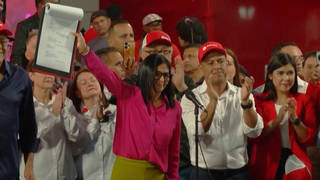

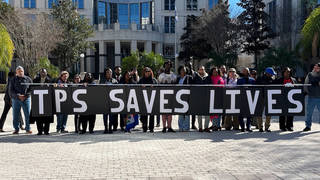
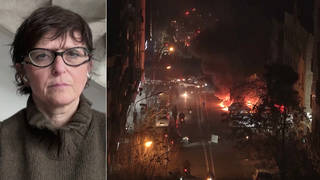





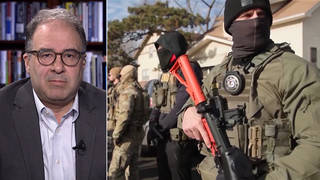

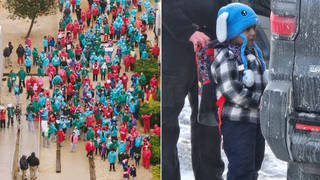
Media Options